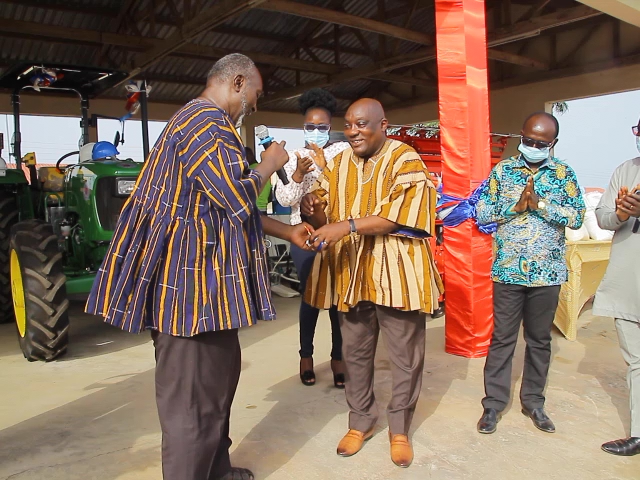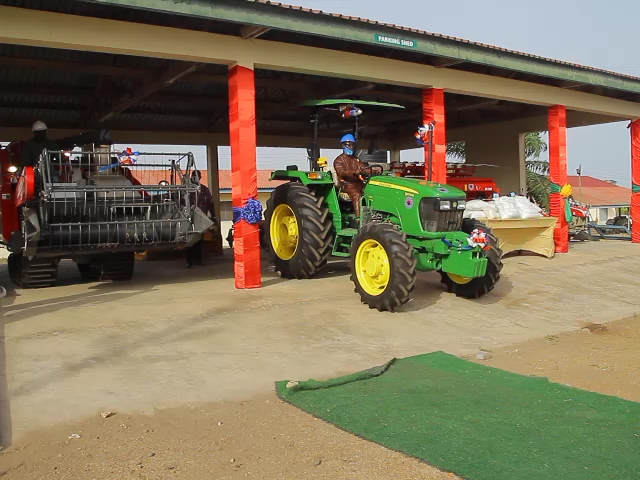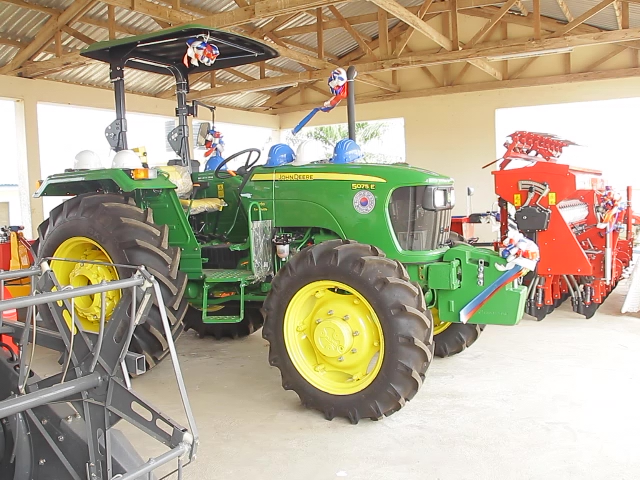As Ghana targets self-sufficiency in rice production, the Ministry of Food and Agriculture is facilitating the provision of funds to support rice processors across the country through financial arrangements with the Agricultural Development Bank.
The Ministry says rice value chain actors can now access loans at a 50% subsidized rate from selected banks across the country.
In a speech read on behalf of the Minister for Food and Agriculture, at the handing over of agricultural equipment by the Korean International Cooperation Agency, the Ministry indicated that the government, through its partners, was working aggressively to achieve self-sufficiency in rice production by 2024.
The equipment, which includes 2 tractors and accessories, and harvesters, among others, was donated by KOICA to complement the government’s effort to improve the rice value chain.

The Chief Director of the Ministry of Food and Agriculture, Robert Ankobea, who spoke on behalf of the Minister, noted that at the inception of the planting for food and jobs campaign in 2017, a total of 1,698 certified rice seeds complemented by fertilizers were distributed to rice farmers across the country.
This, he says, increased to 6,544 metric tonnes in 2019, and 10,950 metric tonnes in 2020. Also, 14, 935 metric tonnes of certified seeds were accompanied by fertilizers.

The Agriculture Ministry says this signals the government’s commitment to improving rice yields towards the attainment of self-sufficiency in rice production by 2024.
The Korean International Cooperation Agency that donated the equipment stated that the project to improve the rice value chain in the Central Region bears a great deal of significance in terms of food security in Ghana.
They indicated that Ghana has so far not been able to meet the domestic demand for rice, making it highly reliant on rice imports.

Seungmin Oh, Senior Deputy Country Director for KOICA, noted that to help Ghana be self-sufficient in the rice value chain, the government of the Republic of Korea has placed a high priority on advancing the agricultural sector in Ghana in cooperation with the Ghanaian government.
He says the project in the Central Region, with a grant budget of USD 8 million from the KOICA, is undoubtedly a tangible example of close cooperation between Korea and Ghana in the agricultural sector.
Statistics show that rice is the sixth most imported product in Ghana, recording more than 1 billion USD worth of imports from 2017 to 2020. KOICA believes this explains why Ghana was seen as vulnerable in the face of an unexpected food crisis back in 2011.
“Today, Ghana is facing even more challenges arising from the inflation in food prices due to the uncertainties surrounding global politics and economics,” he stated.

He said, “And it is for this reason that the Korean government has come up with the project to support Ghana in increasing rice production through modernization and mechanization."
"This project is also, in a way, a significant and strategic investment for Ghana, given that it would help generate more jobs and income in the agricultural sector, which would not only enhance the lives of major beneficiaries such as the local farmers in the region but also those engaged in activities in the broader value chain, including branding and marketing,” he added.
Latest Stories
-
World Bank’s food price index eases; maize, wheat prices hit 3-year low
3 mins -
2020 polls all about pulling Ghana back from precipice of destruction, corruption – Naana Jane
6 mins -
Guru expresses interest in contesting SRC election at UG
13 mins -
Oil prices projected to average $84 in 2024 – World Bank
23 mins -
Meet 2 Ghanaian entrepreneurs on a mission to connect 1m African professionals to global companies by 2034
54 mins -
NCA approves Starlink’s satellite broadband application
55 mins -
Government orders FGR to revamp mining operations; assures workers of commitment to their welfare
1 hour -
Arne Slot philosophy could suit Liverpool – Van Dijk
1 hour -
EC replies Mahama: You also appointed someone who was tagged NDC
1 hour -
See colourful outdoor of Prof Naana Opoku-Agyemang as NDC’s running mate
2 hours -
Akufo-Addo commissions 15MWP Kaleo Solar Power Plant
2 hours -
GCB Bank PLC leads African financial integration, hosts ZICB delegation
2 hours -
Empowering Girls in ICT: FAWE Ghana advocates for gender equality in the Tech sector
3 hours -
Rangnick ‘contacted by Bayern Munich’ about manager job
3 hours -
Winneba Youth Choir celebrates 35th Anniversary with Aseda Concert sponsored by Fidelity Bank
4 hours

